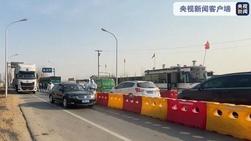 Workers measure a driver's temperature at a checkpoint on the border between Gaocheng district and Zhengding county in Hebei province on Jan 4, 2020. (PHOTO / CCTV VIA CHINADAILY.COM.CN)
Workers measure a driver's temperature at a checkpoint on the border between Gaocheng district and Zhengding county in Hebei province on Jan 4, 2020. (PHOTO / CCTV VIA CHINADAILY.COM.CN)
Hebei province reported Tuesday fourteen newly confirmed COVID-19 cases and 30 asymptomatic results, all locally transmitted, the provincial health commission said.
ALSO READ: 17 local COVID-19 infections among 33 new on mainland
On Monday, the province reported four confirmed cases. Two of them are villagers from Gaocheng district, Shijiazhuang, capital of Hebei. Both of them, in their 50s, didn't leave their villages for most of the past week until their symptoms worsened and they went to local clinics.
Hospitals in Shijiazhuang have tightened measures for COVID-19 prevention and control. All newly admitted patients and any caregivers should have two negative nucleic acid test results before entering wards, the Second Hospital of Hebei Medical University said on Monday
The other two are brothers in their 30s from Nangong of the city of Xingtai, who both visited hospitals several days before they tested positive. The wife of the elder brother is an asymptomatic carrier.
To contain the risk of spread, all villages and communities where the four patients live became medium-risk areas starting on Monday.
For targeted intervention, the county-level city of Nangong has started nucleic acid tests for all of its around 500,000 residents. "Don't go out of or into the city if not necessary," the city's anti-virus unit said.
Hospitals in Shijiazhuang have tightened measures for COVID-19 prevention and control. All newly admitted patients and any caregivers should have two negative nucleic acid test results before entering wards, the Second Hospital of Hebei Medical University said on Monday.
Gaocheng district is known for producing lanterns that are widely used for celebrating Spring Festival, which is on Feb 12 this year.
"Most would-be buyers for our lanterns have canceled their orders due to the new outbreak," said Zhang Fengjun, chairman of local lantern maker Gaocheng Palace Lantern Design and Development Centre Co. "I'm afraid some events might be canceled to reduce transmission risks, like last year."
Besides Hebei province, the country reported nine new local confirmed COVID-19 cases on Monday-two in Beijing, six in Liaoning province and one in Heilongjiang province.
ALSO READ: Virus found on multiple auto part packaging samples in China
Beijing announced on Monday that taxi drivers must register passenger information into a specific mobile platform for epidemic control and prevention purposes if the customer pays for the trip with cash. Digital and contactless payment is being encouraged.
Both drivers and passengers must wear masks during the entire trip and online car-hailing vehicles and taxis should not enter medium-or high-risk areas outside of Beijing, the new regulation said.
Previously, three confirmed cases reported in Beijing were drivers for car-hailing services.
Mass testing
Shunyi district in Beijing had conducted nucleic acid tests on 423,800 people as of Monday afternoon, among which about 415,000 received negative results with the remaining 8,800 still awaiting their results, Zhi Xianwei, executive deputy head of the district, said on Monday.
READ MORE: Beijing's Shunyi district enters 'state of war' against COVID-19
Testing is vital to control the spread and minimize the virus impact on economic and social development.
Mao Yinbai, Spokesman for Shenyang Health Commission
In Shenyang, capital of Liaoning, a second round of nucleic acid testing got underway on Monday morning in three districts.
"Testing is vital to control the spread and minimize the virus impact on economic and social development," said Mao Yinbai, spokesman for the Shenyang Health Commission.
Dalian in Liaoning is conducting stricter quarantine measures after it found some new cases that had a long latency period and spread quickly.
Tang Yi, head of the city's bureau of civil affairs, said on Monday that some cases tested positive after having six or 11 virus tests.
Those who are required to quarantine at home should stay in quarantine for at least 21 days, and receive four tests-one on the first day of quarantine, and then on the seventh, 13th and 20th days, Tang said.
Wu Yong in Shenyang and Zhang Xiaomin in Dalian contributed to this story.
Contact the writers at zhangyu1@chinadaily.com.cn


